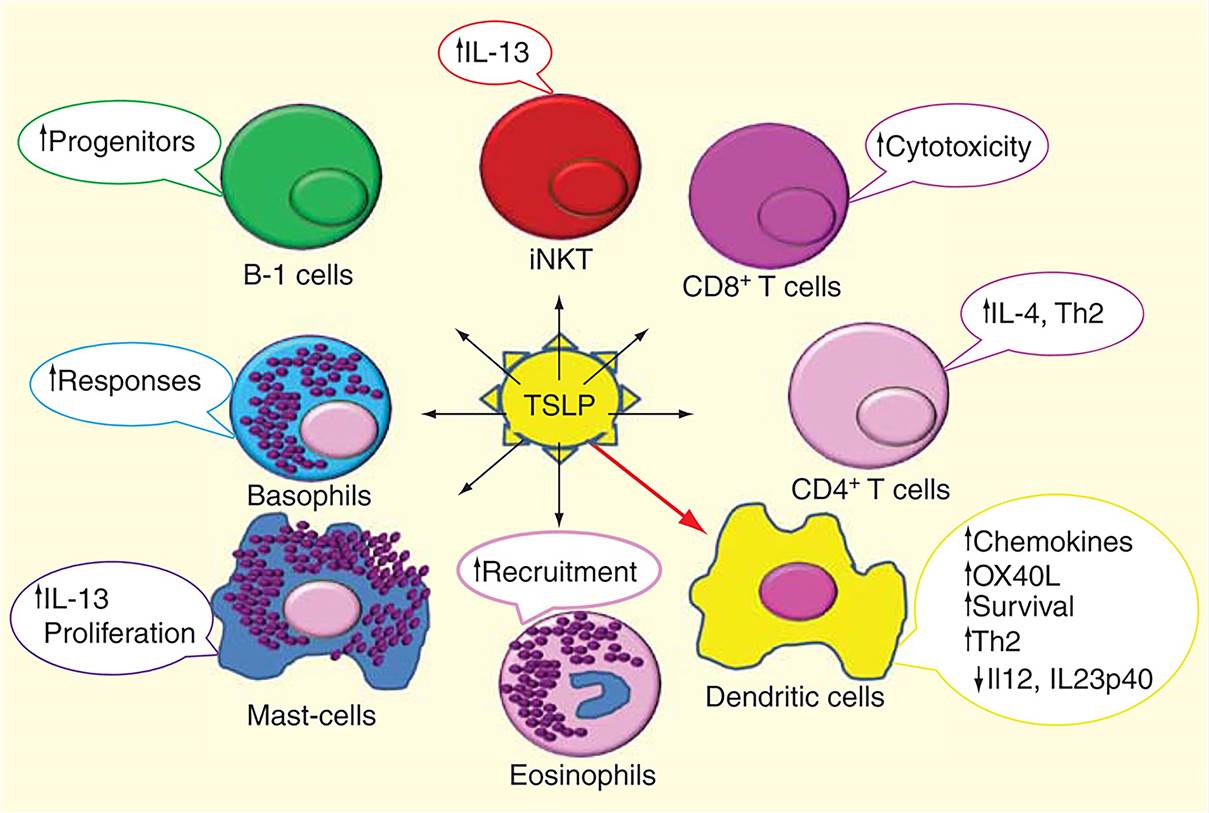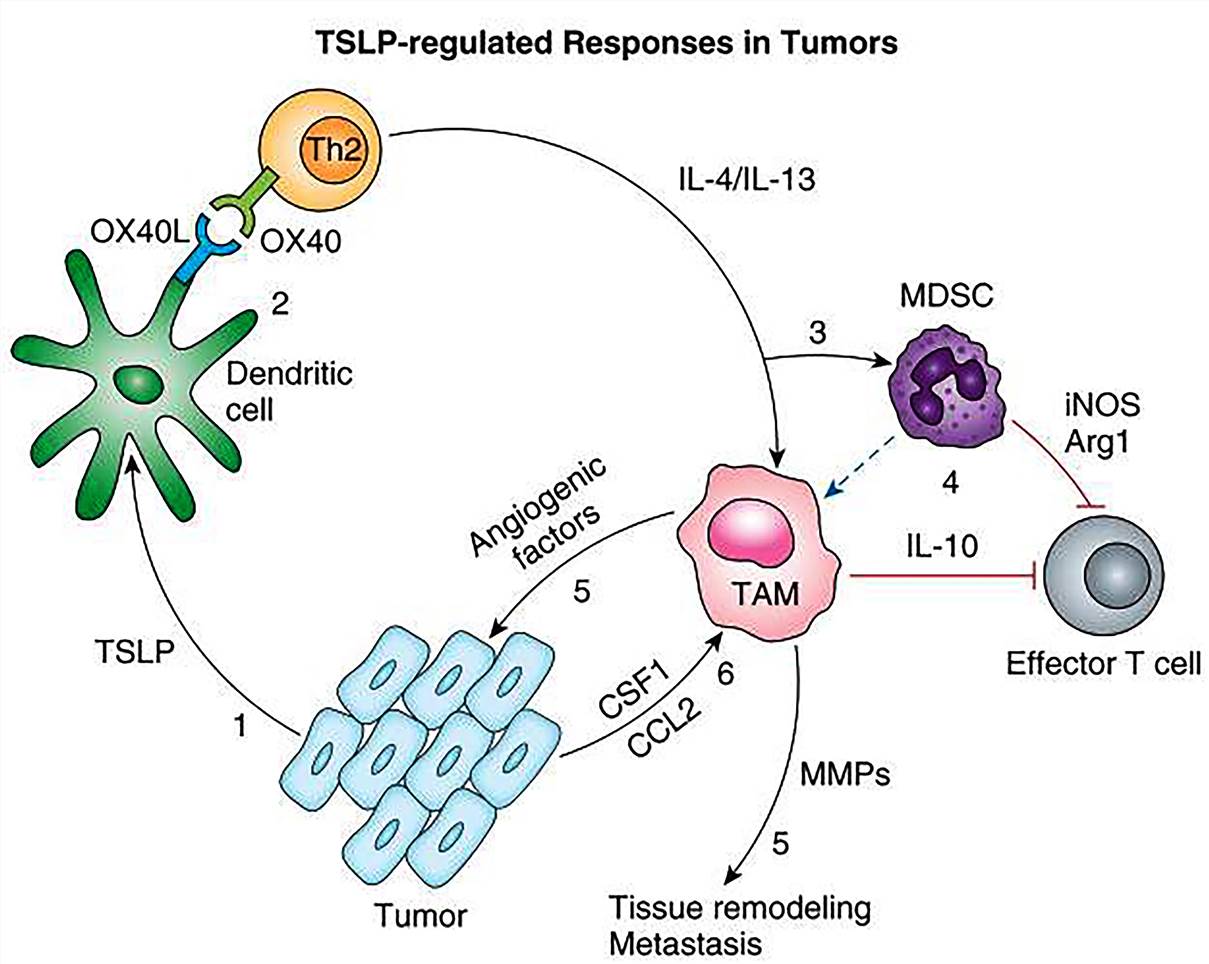TSLP Assay Portfolio Service
Recent studies indicate that thymic stromal lymphopoietin (TSLP) shows an important role in the control of a variety of cancers, such as leukemia and solid tumors, where the TSLP/TSLP receptor (TSLPR) axis has been demonstrated to be a vital regulator. With advanced and high-end technologies, rich experienced scientists, Creative Biolabs is an excellent service provider in the field of tumor marker assay. After long years ahead to fully comprehend tumor markers, we launch the TSLP assay portfolio service which can be useful for targeted cancer therapy and diagnosis.
TSLP Biology
TSLP, an epithelial-derived cytokine, is a member of the four-helix-bundle cytokine family or a distant paralog of IL-7, and plays an important role in barrier immunity by mainly acting on immune cells such as dendritic cells, mast cells and CD4+T cells.
-
TSLP was first identified in the supernatant of a mouse thymic stromal cell line as a factor able to support the proliferation and development of immature B cells.
-
TSLP acted as a co-stimulator for thymocyte proliferation, which suggested that it acts as a lymphopoietin.
-
A homolog (TSLPR) of TSLP was subsequently identified in humans through the use of in silico methods.
TSLP & TSLPR
TSLPR, bound to TSLP with low affinity, is most closely related to the cytokine receptor subunit γc (common γ-chain). It is now known that the functional, high-affinity TSLPR complex is a heterodimer of TSLPR and the IL-7 receptor α-chain. TSLP exerts its biological activities via binding to the heterodimeric receptor consisting of TSLPR and IL-7Rα, and its plays a vital role in various atopic diseases. There has been accumulating researches that TSLP is crucial for the maturation of APCs, and for skewing a T-helper immune response toward the Th2 phenotype, typical of allergic inflammation. TSLP dysregulated expression and its genetic variants have been linked to many diseases, such as asthma, atopic dermatitis, eosinophilic esophagitis and allergic rhinoconjunctivitis, and other immune-mediated diseases such as rheumatoid arthritis, immune defense against helminth and cancer.
 Fig.1 TSLP effect on different immune cell types to enhance Th2 response. (Cianferoni, 2014)
Fig.1 TSLP effect on different immune cell types to enhance Th2 response. (Cianferoni, 2014)
TSLP in Tumors
For many different types of cancers, the Th2 response is dominant over cytotoxicity induced by T-helper 1 (Th1) and CD8 T cells response. It has been shown that increased TSLP was detected in some tumors, such as pancreatic cancer and breast cancer, both of which are related to Th2-related chronic inflammation. TSLP produced by either cancer-associated fibroblasts or tumor cells was important for intratumoral infiltration and Th2 cell differentiation, allowing a permissive environment for the metastasis and growth of these tumors.
 Fig.2 Schematic of TSLP-regulated responses in tumors. (Lo, 2014)
Fig.2 Schematic of TSLP-regulated responses in tumors. (Lo, 2014)
TSLP Blockade Assays at Creative Biolabs Include but Not Limited to:
-
Cytokine assay
-
Angiogenesis assay
-
Metastasis assay
-
Invasion assay
If you are interested in our service, please contact us or directly send us.
References
-
Lo Kuan, E.; et al. Thymic stromal lymphopoietin and cancer. J Immunol. 2014, 193(9): 4283-4288.
-
Cianferoni, A.; et al. The importance of TSLP in allergic disease and its role as a potential therapeutic target. Expert Rev Clin Immunol. 2014, 10(11): 1463-1474.
For Research Use Only | Not For Clinical Use


 Fig.1 TSLP effect on different immune cell types to enhance Th2 response. (Cianferoni, 2014)
Fig.1 TSLP effect on different immune cell types to enhance Th2 response. (Cianferoni, 2014)
 Fig.2 Schematic of TSLP-regulated responses in tumors. (Lo, 2014)
Fig.2 Schematic of TSLP-regulated responses in tumors. (Lo, 2014)
 Download our brochure
Download our brochure